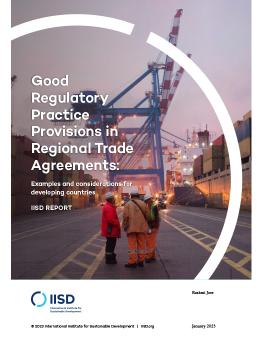
Good Regulatory Practice Provisions in Regional Trade Agreements
Examples and considerations for developing countries
Governments are increasingly negotiating rules on non-tariff barriers in their trade agreements, looking to address this significant source of trade costs. This paper looks at the U.S.-Mexico-Canada Agreement and the EU-Canada Comprehensive Economic and Trade Agreement to see how their respective approaches to good regulatory practices (GRPs)—a type of regulatory policy provision—and what developing countries and least developed countries should consider in their own trade negotiations.
As non-tariff barriers become an increasingly relevant source of trade costs, regulatory policy has become an important feature in trade negotiations and the trade policy agenda overall. This paper provides an overview of how stand-alone regulatory policy chapters are increasingly featured in recent regional trade agreements (RTAs). It then does an in-depth analysis of a specific type of regulatory policy provision—that of good regulatory practices (GRPs)—as these types of provisions are becoming more prolific and are being integrated into a more diverse range of agreements involving both developed and developing countries.
The paper analyzes how GRPs, especially those promoting stakeholder engagement, are evolving in select key RTAs, notably that of the United States–Mexico–Canada Agreement (USMCA) and the EU-Canada Comprehensive and Economic Trade Agreement (CETA). The paper concludes with key insights highlighting the policy implications for developing and least developed countries and proposes some considerations for policy thinking.
This material has been produced with funding from UK aid from the UK Government. Views expressed in the publication are the author’s own and do not necessarily reflect HM Government’s official positions.
Participating experts
You might also be interested in
Agreement on Climate Change, Trade and Sustainability: A landmark pact for trade and sustainability
The ACCTS pact, signed by Costa Rica, Iceland, New Zealand, and Switzerland, aligns trade and environmental policies, tackling fossil fuel subsidies, eco-labels, and green trade.
Addressing Carbon Leakage: A toolkit
As countries adopt ambitious climate policies, this toolkit examines strategies to prevent carbon leakage—when production and emissions shift to nations with weaker climate policies—and explores the trade-offs of each approach.
IISD Trade and Sustainability Review, December 2024
This edition of the IISD Trade and Sustainability Review presents four expert perspectives on how agricultural support and subsidies can promote sustainability in developing and least developed countries.
Why Trade Matters in the Plastic–Pollution Treaty Negotiations
The global push to end plastic pollution by 2040 highlights the critical intersection of trade and environmental action, with upcoming INC-5 negotiations focusing on reducing plastic production, consumption, and waste within a fair and effective international framework.